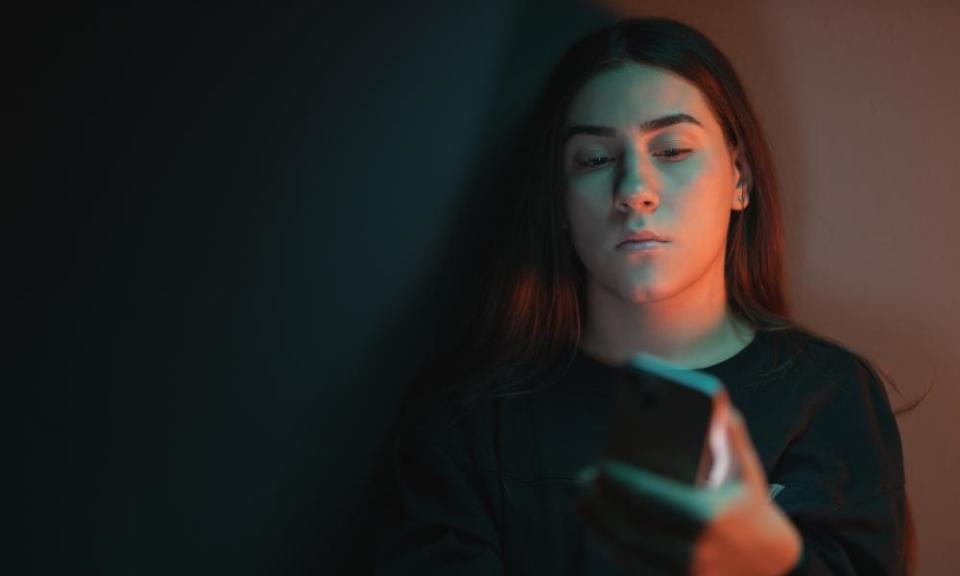Life online is a choking, oppressive smog. Teenagers need a place they can breathe

On the rack of magazines by the supermarket tills, I’m always brought up short by Teen Breathe magazine. Don’t get me wrong, it looks great – well-designed and full of positive, interesting features. But I’m always momentarily incredulous: teenagers need to be reminded to breathe, spend time in nature, journal or mindfully colour mandalas? How did we get here – shouldn’t they be getting their heads stuck in swings or setting fire to bins?
It’s stupid, because of course teenagers need all the help they can get. We are, as a data-heavy transatlantic dossier in the Financial Times explored recently, in a teen mental health crisis. The report highlighted a marked rise in depressive symptoms, worry, negative feelings about life and poor self-image. Meanwhile, a UK report last week showed a 22% increase in self-harm hospital admissions in 8- to 17-year-olds.
The decline in teen mental health dates from 2010-12, when smartphones and social media became broadly ubiquitous, so is it that simple? For a thoughtful, expert look at how far correlation is likely to mean causation, I read psychologist Jacqueline Nesi, who has researched the topic extensively. Nesi does believe social media is likely to be a significant factor, but points out both how varied social media use is (it’s the place you find support and connection, too, after all) and how multifaceted any explanation of this kind of large-scale crisis needs to be.
As someone wisely said on Twitter, this kind of alarming news tends to prompt people to air their pet theories and I suppose mine is that online is basically the air we, including teenagers, breathe now. It’s polluted and probably killing us slowly, but what’s the alternative? All we can do is try to dilute the choking smog of “bold glamour” TikTok filters, violent porn, #thinspo and Andrew Tate.
What with? Other perspectives and possibilities. Anyone who has tried to get a teenager to go on a walk or join a club knows what a fool’s errand that is. But a horse can’t choose to drink if there’s no water, and that’s what’s happening in the UK now. Leisure centres, youth clubs and swimming pools are closing at an alarming rate. Research by the youth charity OnSide late last year showed 29% of kids have had to stop out-of-school activities because of the rising cost of living and 51% of kids spend most of their free time in their bedrooms.
Meanwhile, Next Door groups are full of complaints about “antisocial” behaviour and parents are haunted by county lines gang grooming horror stories. It’s all very well telling kids to get offline for their mental health, but what are we offering them instead?
My other pet theory is that being a teenager is objectively crap – more so now, but always. I found parenting easier when my kids hit their teens because it was still so painfully vivid. Being told I looked “Like Meryl Streep, but ugly”. Trying to cut off a wart with nail scissors and failing at tampons. Getting groped in the local nightclub, or more often, sitting at home with my mum in front of Casualty feeling like a gross, pathetic loser. Grinding boredom, too: if I’d had a smartphone, you wouldn’t have prised it from my sweaty hands from the ages of 13 to, well, now.
The things that made it bearable were crumbs of independence and agency; a sense of possibility. The world in 2023 is far bleaker than when my friends and I were trying and failing to start York Youth CND (four members, two meetings). But I think it becomes less unmanageably frightening when you’re allowed to engage with it on your own terms, separate from your parents, in creative spaces or sports clubs, but also on train platforms and at bus stops, in playgrounds or on the streets. If we really care about teenagers’ mental health, let’s give them affordable, accessible, welcoming places to go; and if we can’t do that, because it’s 2023 and everything’s broken, let’s at the very least give them space and autonomy and tolerate them being teenagers. Let them, well, breathe.
• Emma Beddington is a Guardian columnist

 Yahoo News
Yahoo News 